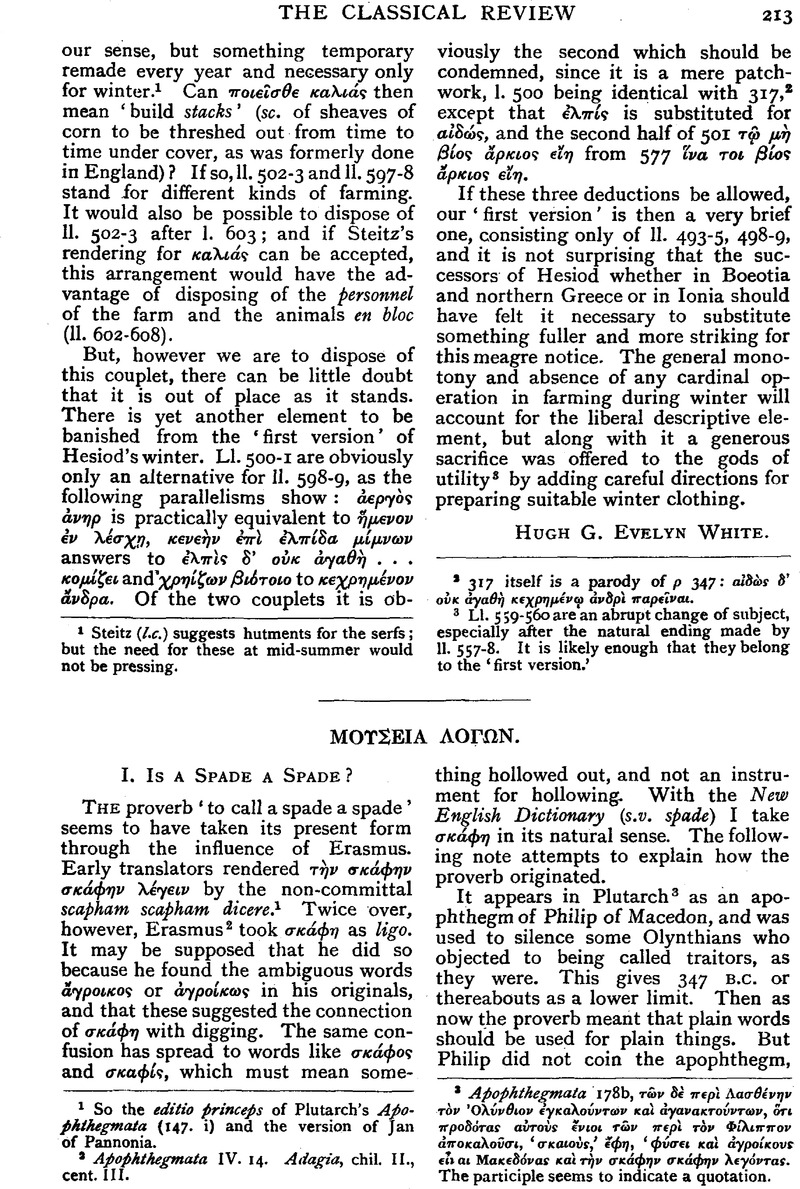No CrossRef data available.
Article contents
MOϒΣEIA ΛOГΩN
Published online by Cambridge University Press: 27 October 2009
Abstract

- Type
- Original Contributions
- Information
- Copyright
- Copyright © The Classical Association 1916
References
page 213 note 1 So the editio princeps of Plutarch's Apophihegmaia (147. i) and the version of Jan of Pannonia.
page 214 note 2 Apophthegmata IV. 14. Adagia, chil. II., cent. III.
page 214 note 3 Apophthegmata 178b,  The participle seems to indicate a quotation.
The participle seems to indicate a quotation.
page 214 note 1 Poetics 1457b I ff. Rhetoric 1404b 31.
page 214 note 2 Lucian, , De Hist. Conscr. 41.Google Scholar
page 214 note 3 Apostolius 15. 95b.
page 214 note 4 Apostolius 16. 10 corrected in Corpus. Paroem. Graec. to ![]() .
.
page 214 note 5 De Jov. Trag. 32; so Julian 7. 208a. Whether this form existed before Philip and was simply quoted by him, or belongs to the new comedy, we need not attempt to decide.
page 214 note 6 Poetics 1458a 18–34.
page 214 note 7 Rhetoric 1405b 4.
page 214 note 8 Deipnosophistae X. c. 70 to end.
page 214 note 9 Antiphanes, Aphrodisios I.
page 214 note 10 Cf. Antiphanes, Agroikos I (Meineke); Anaxandrides, Aischra.
page 214 note 11 On ![]() and
and ![]() as kinds of
as kinds of ![]() , see Aristotle, Rhetoric III. 3, and Spengel, Rhetores Graeci II. 292.
, see Aristotle, Rhetoric III. 3, and Spengel, Rhetores Graeci II. 292.
page 214 note 12 Demetrius, II ![]() 114.
114.
page 215 note 1 Cf. Eubulus, Kampulion 43 ; Antiphanes, Kaineus (parody of Timotheus). Riddles on these articles would also be dramatically convenient, because banqueting-scenes (the proper time for propounding them) must have had a tendency to drag. Clearchus' treatise ![]() gives metrical lists of
gives metrical lists of ![]() and
and ![]() suitable for the purpose (Athenaeus 648f).
suitable for the purpose (Athenaeus 648f).
page 215 note 2 Quoted by Headlam on Agamemnon 4, where examples of such tragic diction are cited. Compare perhaps the parody of Timotheus the dithyrambist in Anaxandrides' Aischra, ending ![]() .
.
page 215 note 3 Cf. Antiphanes, Parasitos, in Athenaeus 169e.
page 215 note 4 Six plays are known to have borne this title. Cf. also Eud. Ethics 1230b 18.
page 215 note 5 See Aristotle, Nic. Eth. IV. 8. The ![]() (his victim would call him
(his victim would call him ![]() ) shines
) shines ![]() , while the
, while the ![]() Hence he dislikes them. The
Hence he dislikes them. The ![]() is
is ![]() just as the
just as the ![]() is
is ![]() or
or ![]() The Theophrastean definitions of
The Theophrastean definitions of ![]() and
and ![]() do not quite hit this mark, for neither touches explicitly on the element of
do not quite hit this mark, for neither touches explicitly on the element of ![]() .
.
page 215 note 6 The classical example of this contrast was the Antiope of Euripides. Callicles in the Gorgias skilfully identifies himself with the rustic Zethus in order to discredit the subtleties of Socrates. It is at least curious to find in Pacuvius' Antiope the same contrast and the same type of protest. Amphion describes his lyre in riddling terms, and is answered, ‘Non potueras igitur hoc [i.e. testudo] a principio, citharista, dicere.
page 215 note 7 See Oppé, The New Comedy, p. 23. Sappho, in Antiphanes' play of that name, was an appropriate person to ask riddles, but that could hardly have exhausted her character.
page 216 note 1 Ar. Rhetoric 1406b 3, ![]() cf. Poetics 1459a 9. The study of
cf. Poetics 1459a 9. The study of ![]() was part of the literary education of the Athenian youth, and to make a cook talk in
was part of the literary education of the Athenian youth, and to make a cook talk in ![]() is again a case of the
is again a case of the ![]() .
.


